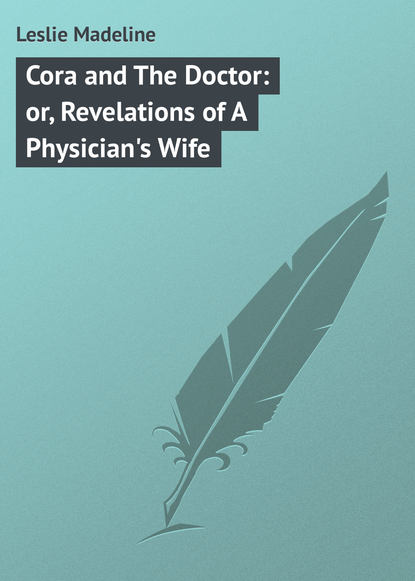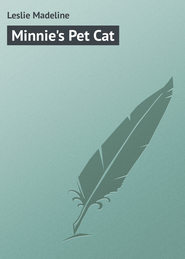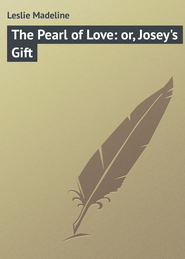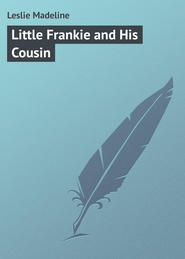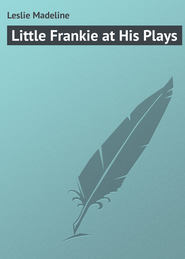По всем вопросам обращайтесь на: info@litportal.ru
(©) 2003-2024.
✖
Cora and The Doctor: or, Revelations of A Physician's Wife
Настройки чтения
Размер шрифта
Высота строк
Поля
Joseph, who was beside himself with rage, flew at Allen, and aimed a violent blow at his head, which the young man dexterously warded off.
Poor Lucy, who had been attracted by the noise below, sprang from her bed, and having thrown on a loose robe, rushed wildly into the room. All stood for one moment speechless with astonishment at her presence, and frightful pallor. She threw herself at her father's feet, begging him not to break her heart. She frantically invoked the spirit of her departed mother to intercede for her, but alas! to no effect. Squire Lee sat motionless while Joseph in a fury rang the bell, and said to the porter, "turn that rascal out of the house."
Allen, seeing there was no hope for him or his dearly beloved Lucy, suddenly caught her in his arms, held her for one brief moment to his breast, bade her farewell, and left the house. There was a sincerity in his grief, a dignity in his manner, which made even the hard hearts of both brother and father quail.
Here at Emily's request, Lucy continued the narrative. "I cannot remember what immediately followed; but when I recovered my consciousness, I was in my own room. Mrs. Burns the house-keeper, almost my only friend and confidant, stood bathing my hands and face. From that time I gave up all hope of happiness with Allen, though he has never ceased to write me the most tender letters, urging me not to despair, but to hope on, and hope ever."
"Love in the earnest mind is not a dream,
To fade in sorrow, or grow dim by age,
But a most true outpouring of the soul;
A pledge of faith, that looking from the past,
And through the present – sees beyond it all
Hope unaffected by earth's weary change."
"I have never written in reply, but have sent messages of unchangeable and undying love. I begged Mrs. Burns, through whom alone we could communicate, to tell my dear Allen, that though I could not marry him in defiance of my father's command; yet I would not marry another. He would never cease to be dearer to me than life."
The distressed girl wept so much, that Emily resumed. Weeks passed on, and Joseph encouraged by her passive obedience, began to think he could now bestow her hand to his own advantage.
Among the vile acquaintances which he had formed in a neighboring city, was Mr. William Arnold, a man about thirty years of age, of whose elegant dress and accomplishments Joseph was never tired of talking. He was often at the house, and Lucy from an instinctive feeling of dislike avoided him as much as possible. She was obliged to meet him at the table, and to treat him with civility as a guest. She says she has sometimes questioned herself as to the ground of her prejudice against him. He is tall, of an elegant figure, and very free, easy manners. He converses well, and has rendered himself a favorite with the old gentleman; but there is a look in his eye which she says cannot be trusted. Then the fact of his being so intimate with her brother is strongly against him.
But when Mr. Arnold began to exhibit a fondness for her society, and whispered soft nothings in her ear, she says "she absolutely loathed him."
"His passionate eye," exclaimed Lucy, starting from her seat in great excitement, "actually makes all my bones to shake. I would willingly have confined myself to my room; but this I was not allowed to do. My father," she added with a deep sigh, "no doubt instigated to such a course by my brother, commands me to appear, as he says whatever company he chooses to invite to the house is only too good for me. I pined and wept in secret, but was required to appear cheerful in the presence of my now avowed admirer."
With a look of horror, the wretched girl said "I had rather die than marry him." She acknowledged, however, that she dared not openly resist her brother's wishes. "When he has been drinking he is – " she checked herself, "very unlike a brother," and she shuddered with fear at the thought.
"I am willing to give up Allen, though he is so very dear to me; but why need they force me to marry this vile man." She said when the Doctor called she longed to ask his advice; but fear restrained her; and then she knew it could do no good. This was said almost in a tone of despair.
In her indignation, Emily was for sending a police officer to take father and son and lock them up in jail. I was silent from astonishment; I had known of cases in France where children were forced to marry against their will; but can it be so, thought I, in this free country? Why then this boast of liberty? I am so much interested in this sweet girl that I have given you a full account of her trials, embracing what was told me during this interview, and what I learned from mother and Frank after her departure. I gave the poor girl all my sympathy, while Emily was very free with her advice, some of which from Lucy's shake of the head, I foresaw it would be difficult, if not impossible, for her to follow. But we both urged her to be firm in refusing to give her hand to one whom she did not respect, and therefore could not love. In this advice we were joined by my husband and mother.
After she left, we sat late talking about Squire Lee. I gathered from what they said, that when the old gentleman first came to the village, he was a poor boy, and was employed as a clerk in a grocer's store. Being a shrewd, active lad, he had worked his way up to be a partner in the firm. Then he married his partner's daughter, at which time they increased their business, and built their distillery. This proved so much more profitable than their grocery, that they sold out their store and devoted themselves entirely to the manufacture of New England rum.
When his father-in-law died, the whole manufactory and trade fell into his hands; and now he is possessed of great wealth. It was certainly known that many houses and farms had passed into his hands; and that a large number of families had been reduced from independence and comfort to beggary through their connection with this ruinous business; this soul-killing establishment.
Frank said his father had often remarked the deplorable effect this traffic had upon the mind and character of his neighbor. From being apparently a kind hearted man, he had gradually become hard, unfeeling and inhuman. Mammon and Bacchus were his gods. Personal ease and domestic tranquillity, neighbors and friends, family and home, his body and his soul, he had sacrificed to these divinities.
Friday, July 3d.
Great preparations are making for the celebration of the Fourth of July, which is the anniversary of the national independence.
I really think Lucy's visit has been of service to Emily by taking her mind from herself. She gave me a sealed note to-day directed to Rev. Frederic Benson, which Frank has enclosed in a wrapper to Mr. Karswell.
Saturday, July 4th.
On many accounts this has been a trying day to me. I suppose I do not yet feel patriotic enough to bear the noise patiently. This morning we were awakened with the first streak of light, by the booming of cannons on a neighboring height. My poor little Pauline screamed and cried. When I took her from her crib into my bed, her teeth chattered from her affright. I tried to talk with her and soothe her; but in truth I had as much as I could do to calm myself. The continued roar made me tremble so much that I could easily sympathize with the frightened girl.
Doctor Frank expressed much sorrow for us, and would gladly have prevented it, if possible; but he said there was no help for it but patience. He comforted both Pauline and myself, by saying he would hurry through his morning calls, as he has no very sick patients, and take us all out into the country beyond the reach of the noise.
After an early dinner we started to rid ourselves of the noise of cannons and bells, which were to commence again their tumult at noon. We had a delightful ride and picnic in a grove. We carried cold chicken, ham and condiments in a basket, and spread them out on a cloth under the trees. Pauline forgot all her troubles, and amused us much by her gayety. She danced and tried to sing in her delight.
When she was tired, she went to Frank and turned her back for him to lift her up. He pretended not to know what she wanted, so as to have the pleasure of hearing her say, "please, papa, take Pauline." It is really amusing to watch them together. She goes quite as a matter of course to him when he sits in the library, and asks him to "take her," waiting patiently for half an hour, it may be, for him to finish reading his paper. Then she is sure of a frolic.
It often makes me laugh till the tears run down my cheeks, to see him dancing about the room, with Pauline perched upon his shoulder, holding tightly to his hair. It is fortunate for the young miss, it is curly, else her hold would not be quite so firm. I wonder what Madame Le Row or Mademoiselle Blanche would say to see Dr. Lenox, "the graceful, refined, but rather too serious Dr. Lenox," capering about the room in that style.
"He will not blush that hath a father's heart,
To take in childish plays a childish part."
CHAPTER X
"If a soul thou would'st redeem,
And lead a lost one back to God; —
Would'st thou a guardian angel seem
To one who long in guilt hath trod, —
Go kindly to him, – take his hand
With gentlest words within thine own,
And by his side a brother stand,
Till all the demons thou dethrone." Mrs. C. M. Sawyer.
Monday, July 6th.
This afternoon, I rode out with Frank to visit an elegant residence, about three miles distant. The house stands on an elevation, and has a beautiful lawn in front, descending toward a small lake or pond; on the shore of which stands a neat but tasteful boat-house, with accommodations for boating or fishing.
I saw a young girl rowing herself in a light skiff. She appeared to me to be about to upset every minute; but Frank told me it was an Indian canoe, which, being very light, can be paddled about with great ease and safety.
On our return, a woman came to the door of her house and requested the Doctor to call at Jones's, where a child was sick, intimating that she wished to say something more, but did not like to do so in my presence. I immediately proposed to alight from the carriage and proceed to the house of the patient, which was but a few steps distant.
Both the outer and inner doors were open, and nothing could be more appalling than the sight presented to my view. The room itself was capable of being made comfortable, if proper care had been bestowed upon it. But at present poverty and filth ruled without restraint.
The sick child lay upon a tottering bedstead, which was covered with pieces of carpet, torn quilts, or anything which could be procured from the floor or elsewhere. A part of an old rag-mat was fastened by two forks to the window at the side of the bed, to serve the double purpose of keeping out the wind and light, as there was hardly a whole pane of glass.
Chairs without backs, and a table under which a barrel had been pushed to serve in the place of a missing leg, made up the inventory of the furniture. On the floor, in the farther corner, lay the remnant of an old straw bed, and upon it was stretched in brutal unconsciousness of all around him the father of the family; the husband of the woman who was weeping over the sick child.
I announced myself as the wife of their physician, and was received by her in a way which led me to suppose she had seen better days. I felt of the little hand, lying over the side of the bed, and found it burning with fever. The sufferer lay with her eyes and mouth partly open, and her hair in a tangled mat about her face and neck.
"How long has she been in this stupor?" I asked, as the child took no notice of me.
"Since early in the morning."
"And have you given her no medicine?"
"Oh, yes! I have tried to force down a little spirit; but her teeth seemed set, so that she could not swallow."
I was never more rejoiced than to see Frank enter, as he did at this moment. He bid the woman get him a clean cloth, and some warm water. The latter she procured from a neighbor's kitchen, while a part of an old apron sufficed for the former.
The Doctor then proceeded to bathe the face, neck, and arms of the child. Afterwards he administered a cooling draught, which the poor, parched mouth eagerly swallowed. He forbade Mrs. Jones to give her any spirit, and left, promising to bring powders for the night.
As we rode home, my heart was full of admiration of my husband, while shame, that disgust had rendered me useless, and pity for the suffering family, alternately occupied my mind. At length, sympathy prevailed, and I said, "Frank, I shall watch with that sick child to night."
"Not for the world!" he replied, quickly; and then continued, more calmly, "The child will do well enough; or rather, she will not be the one to require most attention. I wish she were away from there; but I hardly think," he added, after a pause, "it will do to remove her."





